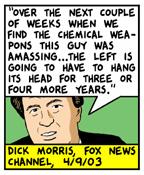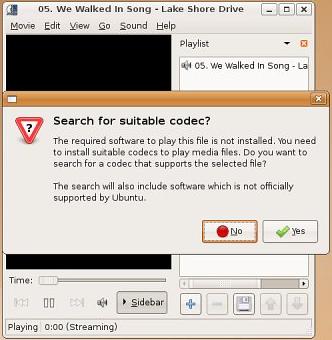This Modern World on Four Years In Iraq

Excellent bonus This Modern World cartoon on Huffington Post: Great Moments In Punditry: Four Years Later. It really is amazing how wrong the punditocracy can be, with no repercussions whatsoever.
 PROVIDED BY THE MANAGEMENT FOR YOUR PROTECTION
PROVIDED BY THE MANAGEMENT FOR YOUR PROTECTION

Of course what happened at Virginia Tech was tragic, but I'm with Twisty on the expected "national response".
These orating gasbags, with their inane “moments of silence” and paternalistic “days of mourning” whipped up special for the TV cameras, are themselves crazy men. Displaying the disingenuous maggotry that passes these days for statesmanship, they’ll hitch their political wagons to any convenient spontaneous tragedy for an opportunity to convince a global audience that, despite their sponsorship of other, more distant, more invisible, or more devastating calamities, they are in fact capable of humanity.
What kind of moron buys that crap? It’s tragic when some random dude goes off his nut and kills indiscriminately, but it’s unconscionable when an elected government does exactly the same thing on a global scale and everyone swells with national pride.
There ought to be a National Day of Mourning every fucking day until the war is over.
There's a new version of the Linux distribution Ubuntu out now. Codenamed "Feisty Fawn" it is, according to current conventional wisdom, the easiest of all the Linux versions. I'm a developer, and a geek, and I've made attempts at going the Linux route before, though I've always given up in the face of too much day-to-day hassle. So I thought, maybe I'll try this hot new Ubuntu thing out, maybe, just to see for myself.
For people wanting simplicity from their Linux distribution, Ubuntu 7.04 (Feisty Fawn) may well be the best release ever from any Linux company. While using Feisty Fawn from the late beta stage and right on up to upgrading to the final version, I kept thinking “Feisty is so easy, my mom could use this!” Not to say you can’t get more obtuse with command line syntaxes in Feisty, but for the folks that wants their Linux distro to work with a minimal amount of fuss, Feisty Fawn is a smashing success. The installation is really as easy as 1-2-3 and from there you can set up your desktop with a minimal (and I mean minimal) amount of fuss. In fact, I found setting up Feisty Fawn to be far easier than Windows Vista or XP in that department. There’s no need to hunt down drivers and software from the internet and things just work out of the box.
A great example of how Ubuntu is making Linux more accessible for non-Linux folks is the manner in which proprietary codecs like mp3 are installed. Because of licensing issues mp3 codecs are not installed by default in most Linux distributions. For the end user, sometimes this creates confusion, but not in Feisty Fawn. As soon as you click on a mp3 file in Nautilus or Konqueror file browsers, a pop window appears asking you if you would like to install the proprietary codecs necessary to play the file. Very well done Ubuntu.

Via jwz, the story of São Paulo's new no-billboard law.
Imagine a modern metropolis with no outdoor advertising: no billboards, no flashing neon signs, no electronic panels with messages crawling along the bottom.
Come the new year, this city of 11 million, overwhelmed by what the authorities call visual pollution, plans to press the "delete all" button and offer its residents unimpeded views of their surroundings.
Here's a good summary of the U.S. Attorney purge scandal so far, at Scott Rosenberg's blog: The U.S. attorney purge and Watergate.
In the U.S. attorney purge scandal as with Watergate, the "it's just not a big deal" defense is collapsing — only faster this time.
...Notice the priorities: Under Rove and Gonzales, your job as prosecutor was to go after the indigent and the illiterate who goofed somewhere on their election registrations. But if you went after actual extortionists and bribe-takers like disgraced former congressman Duke Cunningham, you faced the ax.
...The damage is already done: the selective U.S. attorney purge means that for years to come a cloud will hang over every federal prosecution that involves either party. Thanks to what Gonzales and Rove have achieved — the abject politicization of the American justice system in pursuit of partisan goals — we'll always be wondering: Were those charged brought because a prosecutor found evidence — or because a political campaign needed help?
So the next time you hear someone carping that the attorney scandal is overblown? Remember that, like Watergate before it, its small details add up to something significant: a White House-led assault on the integrity of elections.
most of the relatively non-partisan and professional US Attorneys simply didn't find any actual fraud. Choosing not to indict people on bogus charges got at least two of the US Attorneys (Iglesias and McKay) fired. And we are seeing evidence that others may have been nudged out less directly for the same reasons. In turn they've been replaced by a new crop of highly-political party operative prosecutors who, in the gentle wording of the Times, "may not be so reticent" about issuing indictments against people who have committed technical voting infractions with no intent to cast a fraudulent ballot.

Via A Tiny Revolution, this story on CommonDreams: The Martin Luther King You Don’t See on TV.
It’s become a TV ritual: Every year on April 4, as Americans commemorate Martin Luther King’s death, we get perfunctory network news reports about “the slain civil rights leader.”
The remarkable thing about these reviews of King’s life is that several years – his last years – are totally missing, as if flushed down a memory hole.
What TV viewers see is a closed loop of familiar file footage: King battling desegregation in Birmingham (1963); reciting his dream of racial harmony at the rally in Washington (1963); marching for voting rights in Selma, Alabama (1965); and finally, lying dead on the motel balcony in Memphis (1968).
An alert viewer might notice that the chronology jumps from 1965 to 1968. Yet King didn’t take a sabbatical near the end of his life. In fact, he was speaking and organizing as diligently as ever.
Almost all of those speeches were filmed or taped. But they’re not shown today on TV.
Why?